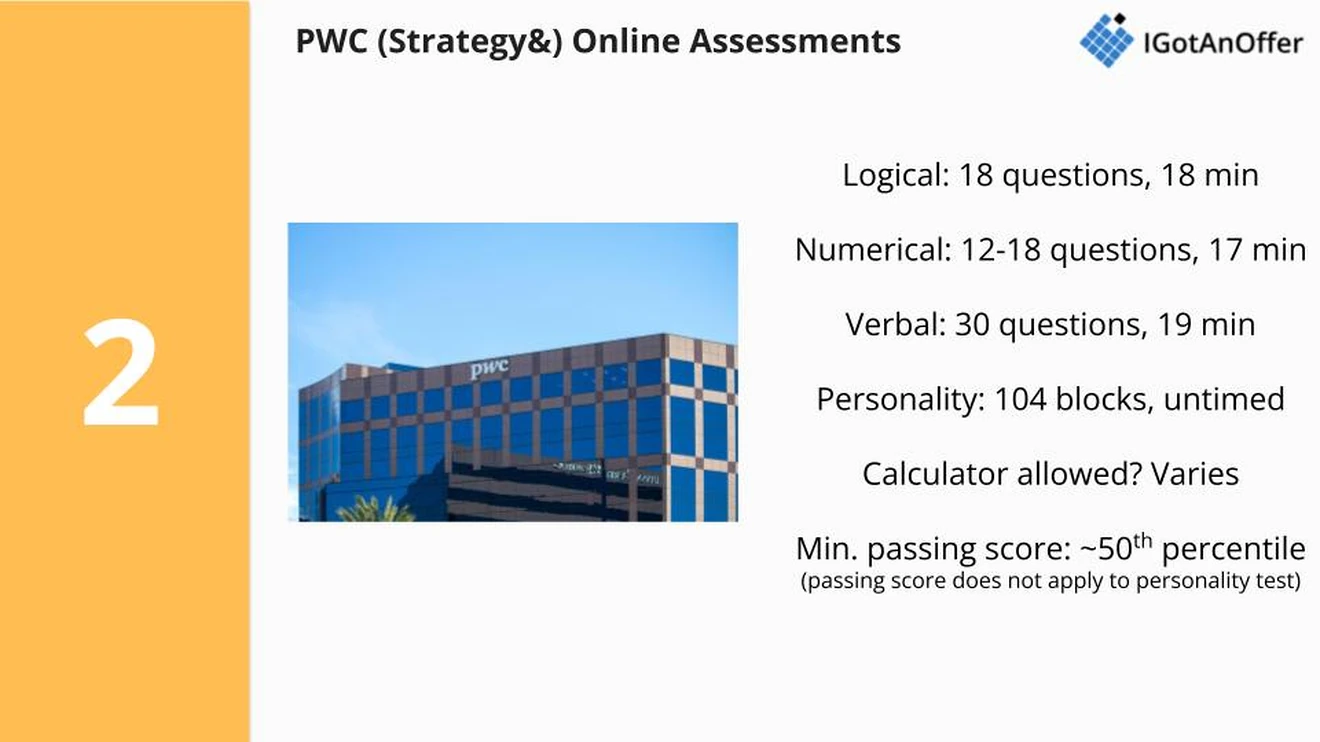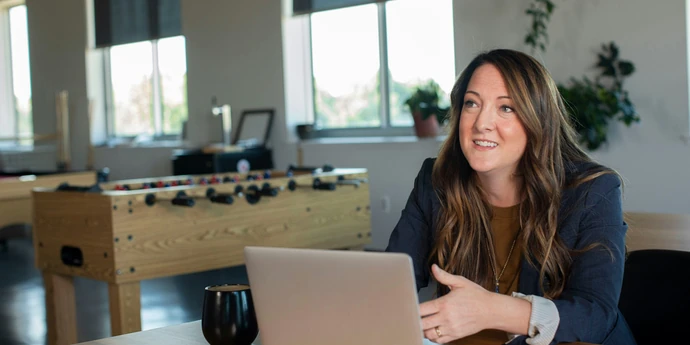Interviewing at PwC and their strategy subsidiary (Strategy&) is very demanding. PwC uses a combination of case interviews, written case presentations, and group case study interviews to evaluate candidates.
This may sound overwhelming, but don't worry. We've put together the ultimate guide to PwC's consultant interview process. With the information and resources below, you'll be one step closer to landing a job offer.
Here's an overview of what we'll cover:
- About PwC
- Interview process
- Fit and PEI questions
- Case interviews
- Group case interviews
- Presentation
- Preparation
Right, let's get into it.
Click here to practise 1-on-1 with PwC ex-interviewers
1. PwC consulting is bigger than all the MBB firms
When it comes to consulting, PwC is a juggernaut. With $22bn in consulting revenue in 2022, PwC's consulting business line is bigger than McKinsey, BCG and Bain combined.
The huge growth of PwC's consulting business has been driven primarily through acquisitions. This includes the acquisition of Booz & Company in 2014, which formed the PwC group known as Strategy&.
PwC divides their consulting business into 2 primary branches.
- Strategy& focuses on executive level strategy, including capability identification, operating model, and market position. It also advises on creating growth, by increasing margins, reducing costs, and driving lean operations.
- PwC Consulting focuses on digital strategy, implementation of technology tools, and integration and innovation programmes. But also M&A strategy, executing deals, restructuring organizations, and implementing post-merger improvements.
The work you'd do in the Strategy& branch of PwC, is very similar to the work you'd find at McKinsey, BCG or Bain. Whereas the work you'd be doing in PwC Consulting is closer to the type of consulting the other Big 4 firms do. If this peaks your interest, you can learn more in our article that compares Big 4 to MBB firms.
2. PwC (Strategy&) interview process overview
PwC Consulting and Strategy& use 4 steps in their recruitment process:
- Resume and cover letter screening
- Online assessment tests
- First round interviews
- Second round interviews
Let's take a closer look at each step. Please keep in mind that each step may vary based on location and role. It's always a good idea to check with your HR contact, to get more specific details based on your interview track.
2.1. Resume and cover letter screening
First, recruiters will look at your resume and assess if your experience matches the open position. This is the most competitive step in the process—we’ve found that 90% of candidates don’t make it past this stage.
You can use this free resume guide and this free cover letter guide to help tailor your application to the position you’re targeting.
And if you’re looking for expert feedback, you can also get input from our team of ex-MBB recruiters, who will cover what achievements to focus on (or ignore), how to fine tune your bullet points, and more.
2.2 PwC (Strategy&) online assessment tests
After the initial application, you'll face the online assessment. The assessment may be one or multiple tests. To get through to the next round, you'll need to score better than at least 50% of applicants (50th+ percentile).
Here's a snapshot of the assessment tests used at PwC Consulting (note: you can expect similar tests at Strategy&).

A lot of candidates are eliminated at this stage, so make sure you practice beforehand and that you're getting good scores before taking the real thing.
You can practice taking the test on the PwC website.
2.3 First round interviews
First round interviews are usualy conducted via an online video call. You can expect one behavioral interview, and one case interview, often in the form of a market siziing question. These will be unstructured, in the sense that you won't be given any additional information when you're asked the question (you'll need to ask questions in order to get that). Recent examples reported on Glassdoor include:
- Estimate the size of the market for a pen manufacturer
- What is the size of the market of computer mouses in France (BtoB & BtoC segments)?
- Estimate the size of the market for accounting services for SMEs.
2.4 Second round interviews
Second round interviews are usually a "Super Day", OR a case presentation. Note that the term "Super Day" is usually used in the US, and the term "Assessment Centre" is more common in Europe.
Here's what it entails:
- Super Day (Assessment Centre)
- All-day evaluation at a PwC facility
- 2 behavioral interviews
- 1-2 standard case interviews (structured or unstructured)
- 1 group case interview (structured)
- Written case presentation
- Receive a case from the recruiter
- Prepare a PPT deck with your analysis
- Present in-person and engage in Q&A
Now you have a good overview of the interview process, let's take a look at what kind of questions you can expect to face and how you can prepare to ace each part of your PwC consulting interviews.
3. Top behavioral interview questions asked at PwC (Strategy&)
Behavioural interview questions asked at PwC Consulting and Strategy& fall into two main categories:
- Fit questions. These are generic questions such as “Why consulting?” or “Why PwC?”.
- Personal Experience Interview (PEI) questions. These are questions such as “Tell me about a time when you led a team through a difficult situation.” Or “Tell me about a time where you had to manage a team conflict”
To prepare, consulting fit / PEI questions in the past. But in summary here are the top 5 fit and PEI questions you should prepare for at PwC, Strategy&, or other consulting firms.
Top 5 fit questions:
- Why PwC? (this article will help)
- Why consulting?
- Walk me through your resume
- Tell me about something not on your resume
- Tell me about your greatest accomplishment
Top 5 PEI questions. Tell me about a time when ...
- You led a team through a difficult situation
- You worked in a team and had to manage a conflict
- You had a disagreement with a colleague / boss
- You had to change someone's / a group's mind
- You overcame a really difficult challenge
If you would like guidance on how to answer these and any other behavioral questions you're likely to face in your PwC interview, questions, check our article on the McKinsey Personal Experience Interview (it's totally relevant for non-McKinsey candidates too).
Now, let's crack some cases!
4. PwC (Strategy&) case interviews
Case interviews at PwC Consulting and Strategy& are candidate-led. The style is similar to what you will experience in a BCG case interview or a Bain case interview.
For a candidate-led case interview, there are 7 types of questions you need to prepare for:
- Situation
- Framework development
- Framework exploration
- Quant question – Data provided
- Quant question – No data provided
- Creativity question
- Recommendation
You can read more about case interviews and how to prepare for them, in our free case interview guide. You can also get a sense of what candidate-led case interviews are like, using the video below. As we mentioned, case interviews at PwC Consulting (and Strategy&) are typically candidate-led and therefore use the same format as BCG and Bain.
5. PwC (Strategy&) group case interviews
As mentioned in the overview above, group case interviews are sometimes used in the second round at PwC Consulting and Strategy&. Here is the key information you need to be aware of for this type of interview:
- Candidates get divided into groups of 4 to 6
- Each group is given information about a case (i.e. a client facing a problem)
- You are given 10mins to review the materials by yourself or with another person in your group
- You are then asked to discuss a few questions about the case for 20mins with the rest of your group in front of your interviewers
- The interviewers will ask a few questions to the group for 15 to 20mins
Click here to download a sample group case study interview problem from PwC.
This type of case mainly tests your ability to work with others. Interviewers won't intervene during the group discussion. They will just observe the group dynamics and mark each participant based on how they are contributing to the discussion.
Here are the top 3 things you should aim to do in your group interview:
- Speak with a purpose. At the beginning of a group discussion, a lot of candidates will want to speak their mind as they know participating is important. But participating is not enough. The QUALITY of your input is crucial. Sometimes, it's better to let two or three people get the discussion started. And to then make a very thoughtful point based on how they started the discussion. Focus on the quality of your input, not the quantity.
- Involve everyone. Another tip that's easy to apply is to keep an eye on who's participating in the conversation and who's not. If you identify a member of the group who's struggling to make themselves heard, you should not hesitate to help them be heard by saying something like: "We haven't heard everyone's opinion on this yet. John, Rebecca what do you think?"
- Summarise. Finally, at the end of the 20 minutes group discussion it's a good idea to summarise the different points people have made. This will position you as the person bringing everyone together and making sure all candidates are on the same page. It is something some partners in consulting like doing with clients in real life and will therefore reflect positively on you.
And the top 3 things you should really avoid doing:
- Being easy to read. Group interviews is the time to put your poker face on. Everyone is stressed in a group interview. But you need to try your best to come across as confident. A good way to do this is to focus on basic body language: look at people in the eye, sit confidently, don't cross your arms, try not to fiddle with your hands, etc.
- Interrupting others. Consultants need to be client-friendly, and interrupting someone in a discussion is not client-friendly at all. You should listen carefully to what others are saying. Try to have a genuine interest in what they think. Before making your point, summarise their point to show that you understand what they mean.
- Dominating the conversation. Finally, some candidates are so eager to participate in the conversation that they end up completely dominating the rest of the group without realising it. A good tip to avoid this is to keep an eye on how much time you talk. If you are in a 5-person group you should aim to speak 20% (1/5th) of the time and really no more than 25%.
Your performance in regular and group case interviews will play a big role in the firm's decision to give you an offer. If you'd like to learn more about group case interviews, check-out our separate detailed guide here.
6. PwC (Strategy&) case presentations
The final type of case interview used by PwC (Strategy&) is a written case presentation.
Here's a quick overview of what to expect:
- Receive the case 2 days in advance
- Prepare PPT slides with your recommendations and supporting data
- On the day of your interview, you'll have a...
- 15-30 minute rehearsed presentation
- 15-30 minute Q&A discussion with the interviewer
PwC Consulting does written cases a bit differently than other firms. For example, BCG would only give you 1-2 hours to prepare, but PwC Consulting sends the case 48 hours in advance.
For this type of interview, Strategy& more closely resembles BCG and Bain, because they may not provide the case until you're at the interview location.
As a note, a written case presentation is VERY different from a normal case interview, so don't think you can get through on your normal case interview skills. In order to prepare, we recommend you study our in-depth written case interview guide.
7. PWC (Strategy&) case interview preparation plan
In this section, we're going to cover the most important things you can do in order to prepare for your interview and land that consultant job at PwC.
7.1 Learn the case interview essentials
The best starting point for your case interview prep is our case interview prep guide. It'll take you through all the different types of questions you may be asked in your case interview, show you how to draw from different frameworks to structure your answer, and give you example cases to practise with.
7.2 Become really confident at maths
You don't have to have a perfect GPA or GMAT score to succeed at case interview maths. However, during your PwC / Strategy& interviews, you will be expected to quickly perform accurate mental maths.
In order to do this, it’s essential to know the formulas for common metrics, like return on investment or breakeven point. And it’s also helpful to know a few maths shortcuts to help you solve problems more quickly. To learn more about these topics, check out our free guide to case interview maths.
In our experience, the most successful applicants start their interview preparation by practising maths skills, so make sure you prioritise this step.
7.3 Research the company
PwC Consulting and Strategy& interviewers want to hire candidates who are deeply motivated to work for their firm. Make sure you're up to date in the latest developments in the area of the company you're applying to join. The Strategy& homepage and the PwC and Strategy& YouTube channels are good places to start.
Be sure to read what PwC say about their values and what they're looking for. In addition, do some networking so that you can show you've made the effort to reach out to current staff.
7.4 Practise with peers
Once you're in command of the subject matter, you'll want to start practising cases. But by yourself, you can’t simulate thinking on your feet or the pressure of performing in front of a stranger. Plus, there are no unexpected follow-up questions and no feedback.
If you have friends or peers who can do mock interviews with you, that's an option worth trying. It’s free, but be warned, you may come up against the following problems:
- It’s hard to know if the feedback you get is accurate
- They’re unlikely to have insider knowledge of interviews at your target company
- On peer platforms, people often waste your time by not showing up
For those reasons, many candidates skip peer mock interviews and go straight to mock interviews with an expert.
7.5 Practise with experienced case interviewers
In our experience, practising real interviews with experts who can give you company-specific feedback makes a huge difference.
Find a consulting interview coach so you can:
- Test yourself under real interview conditions
- Get accurate feedback from a real expert
- Build your confidence
- Get company-specific insights
- Learn how to tell the right stories, better.
- Save time by focusing your preparation
Landing a job at a top consulting company often results in a $50,000 per year or more increase in total compensation. In our experience, three or four coaching sessions worth ~$500 make a significant difference in your ability to land the job. That’s an ROI of 100x!















